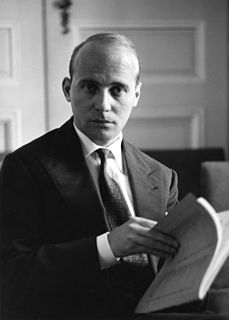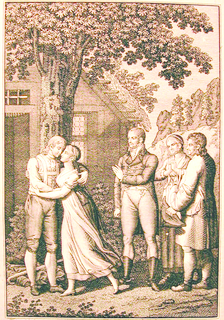
Antigonae (Antigone), written by Carl Orff, was first presented on 9 August 1949 under the direction of Ferenc Fricsay in the Felsenreitschule, Salzburg, Austria, as part of the Salzburg Festival. Antigonae is in Orff's words a "musical setting" for the Greek tragedy of the same name by Sophocles. However, it functions as an opera.

Paul Hindemith was a prolific German composer, violist, violinist, teacher and conductor. In the 1920s, he became a major advocate of the Neue Sachlichkeit style of music. Notable compositions include his song cycle Das Marienleben (1923), Der Schwanendreher for viola and orchestra (1935), and the opera Mathis der Maler (1938). Hindemith's most popular work, both on record and in the concert hall, is likely the Symphonic Metamorphosis of Themes by Carl Maria von Weber, written in 1943.

Mathis der Maler is an opera by Paul Hindemith. The work's protagonist, Matthias Grünewald, was a historical figure who flourished during the Reformation, and whose art, in particular the Isenheim Altarpiece, inspired many creative figures in the early 20th century.

Venus und Adonis is a one-act opera by Hans Werner Henze with a German libretto by Hans-Ulrich Treichel, after the poem by William Shakespeare. The work uses singers and dancers.

König Hirsch is an opera in three acts by Hans Werner Henze to a German libretto by Heinz von Cramer after Il re cervo, a theatrical fable (1762) by Carlo Gozzi. He revised it as Il re cervo, premiered in 1963 at the Staatstheater Kassel.
Der Golem is an opera in three acts by composer Eugen d'Albert. The work uses a German language libretto by Ferdinand Lion after Arthur Holitscher's 1908 play Der Golem: Ghettolengende in drei Aufzügen. The opera premiered on 14 November 1926 at the Alte Oper in Frankfurt under conductor Clemens Krauss.

Das Märchen von der schönen Lilie, Op. 55, is an opera in two acts by Giselher Klebe, with a libretto by Lore Klebe, based on Goethe's fairy tale Das Märchen. On a commission by the SWR for the Schwetzingen Festival, it was premiered on 15 May 1969 at the Schlosstheater Schwetzingen, staged by Oscar Fritz Schuh and conducted by Hans Zender. The opera was published by Bärenreiter.

The Baden-Baden Lesson on Consent is a Lehrstück by the German dramatist Bertolt Brecht, written in collaboration with Slatan Dudow and Elisabeth Hauptmann. Under the title Lehrstück it was first performed, with music by Paul Hindemith, as part of the Baden-Baden festival on 28 July 1929, at the Stadthalle, Baden-Baden, directed by Brecht, designed by Heinz Porep.

Die Schweizer Familie is an opera by the Austrian composer Joseph Weigl. It takes the form of a Singspiel in three acts. The libretto, by Ignaz Franz Castelli, is based on the vaudeville Pauvre Jacques (1807) by Charles-Augustin de Basson-Pierre, known as Sewrin, and René de Chazet. The opera was first performed at the Theater am Kärntnertor, conducted by the composer, in Vienna on 14 March 1809 and was a great success in German-speaking countries in the early 19th century.

Das Nusch-Nuschi, Op. 20, is an opera in one act by Paul Hindemith, with a German libretto by Franz Blei.

Mörder, Hoffnung der Frauen is an opera in one act by Paul Hindemith, written in 1919 on a German libretto by Oskar Kokoschka which he based on his play of 1907. The opera was the first in a triptych of expressionist one-act operas, the others being Das Nusch-Nuschi, and Sancta Susanna. They were the first operas written by Hindemith. The first two were premiered together in Stuttgart on 4 June 1921, all three were performed at the Oper Frankfurt in 1922.

Die Harmonie der Welt is an opera in five acts by Paul Hindemith. The German libretto was by the composer.
Dezső Ernster was a Hungarian opera singer who sang leading bass roles with the New York Metropolitan Opera from 1946 to 1963. In 1929, he created the role of Baron d'Houdoux in Hindemith's Neues vom Tage.

Ouvertüre zum „Fliegenden Holländer“, wie sie eine schlechte Kurkapelle morgens um 7 am Brunnen vom Blatt spielt is a musical parody for string quartet by Paul Hindemith, based on the overture to The Flying Dutchman by Richard Wagner. The piece dates to c. 1925 and in performance lasts approximately eight minutes.

Bluthochzeit is an opera in two acts by Wolfgang Fortner. The libretto, also by Fortner, is based on Enrique Beck's German translation of García Lorca's 1933 play Bodas de sangre. It premiered at the Cologne Opera on 8 June 1957.
Rolf Riehm is a German composer who wrote stage and orchestral works as well as music for ensembles and solo instruments. He began as an oboist and music teacher and was later a professor of music theory at the Hochschule für Musik und Darstellende Kunst Frankfurt am Main for several years.
Giselher Schubert is a German musicologist
Andres Briner was a Swiss music historian, academic and art journalist
Dieter Rexroth is a German musicologist and dramaturge.
Hermann Danuser is a Swiss-German musicologist.









